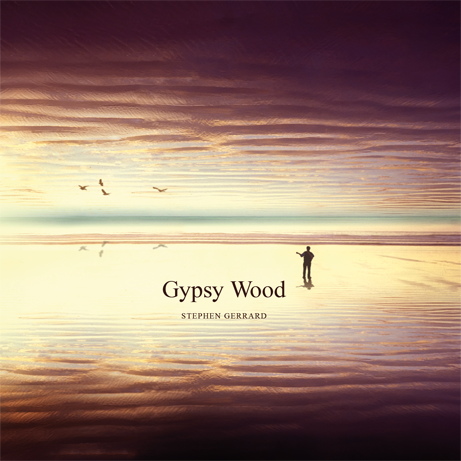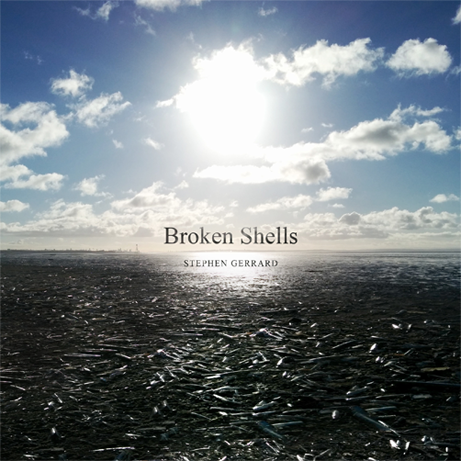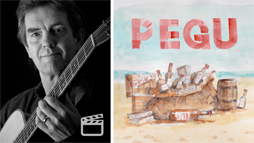STEPHEN GERRARDFOLKSINGER, SONGWRITER & GUITARIST

Personal & soulful REFLECTIONS ON true-life experiences
GYPSY WOOD
Select a track to listen and find out more about the song.
-
01.Gypsy In His Soul+
Although this song is not entirely biographical, it does express a deeply innate family trait for 'freedom' and 'privacy' which appears to have been inherited from Stephens Great Grandfather who was himself a Romany Gypsy.
View on Youtube to leave a comment or subscribe to Steve’s Channel -
02.Gareth’s Song+
Gareth was a pupil at a Special School in Liverpool where Stephen was a teacher in the 80’s. One summer they went on a day trip to Freshfield. They walked across the fields towards the shore. Gareth looked around him and asked “Is this heaven?”. He couldn’t imagine anywhere more beautiful. After a full day of enjoyment he didn’t want to return to Liverpool. He was in love with the Care Assistant who was called Julie and tried to persuade her to live with him in Freshfield. The pupils were talking about what they wanted to be when they grew up. Gareth thought for a moment and said “A person, just a person whose happy”.
View on Youtube to leave a comment or subscribe to Steve’s Channel -
03.Man Of Our Times+
The song is an attempt to highlight some of the characteristics of modern man who is losing his ability to connect in a human and spiritual sense with the world around him. The song was inspired by the book ‘True Resurrection’ written by Harry Williams.
View on Youtube to leave a comment or subscribe to Steve’s Channel -
04.Still My Little Girl+
Written for Stephen’s daughter, but relevant to all Fathers who have watched their daughters grow up.
View on Youtube to leave a comment or subscribe to Steve’s Channel -
05.Georgie’s Song+
One Christmas a boy called Georgie waited for his Mum to visit him in a children’s home. Whilst he waited he began fiddling with the cuffs of his shirt. She never visited him in all the years Stephen knew him and he never stopped fiddling with his shirt. The sadness of his life is reflected so many others for whom the impact of neglect and abuse has profound effects.
View on Youtube to leave a comment or subscribe to Steve’s Channel -
06.A Quiet And Solitary Man (Bill Tasker)+
As a young lad Stephen would sometimes visit Bill with his friends. He was always welcoming and happy to chat. He didn’t mind their curiosity and was happy to allow them to look inside his cabin which sheltered him and his canine friends from the elements. The song tells the story.
View on Youtube to leave a comment or subscribe to Steve’s Channel -
07.Gypsy Wood+
What was once a small section of coastal pinewood in Stephen’s hometown of Formby. He wrote the song after viewing a number of photographs taken by his father which chronicled its disappearance in to the sea as erosion sadly took its course.
View on Youtube to leave a comment or subscribe to Steve’s Channel -
08.You And I+
Evolved from a poem written during the second world war by Stephen’s father who served in a field hospital in Algeria, North Africa. A peace anthem, as relevant today as it was 50 years ago.
View on Youtube to leave a comment or subscribe to Steve’s Channel -
09.Another Kind Of Madness +
Despite western lifestyles outwardly appearing peaceful, fulfilled and happy, there are still victims and suffering within this overindulgent, greedy and dissatisfied culture. The song questions this ‘madness’ by contrasting typical western lifestyles with the lives of people in warzones and the third world countries.
View on Youtube to leave a comment or subscribe to Steve’s Channel -
10.Blazing The Trail+
Written after the death of Stephen’s father.
View on Youtube to leave a comment or subscribe to Steve’s Channel

You can download this album free of charge. Start Download
Email Stephen if you enjoyed it:
steve@stephengerrard.com
Broken SHells
Select a track to listen and find out more about the song.
-
01.Shanty Boat+
From time to time we can all feel like escaping from our own lives and sailing away. Two years before retiring Stephen found himself sitting in the office dreaming of what he would most like to do. He pictured himself looking like old Huckleberry Finn sailing down one of the big American rivers on a shanty boat. On completing this album Stephen was invited to join another musician on his shanty boat as he sailed from Liverpool to London on the canal. Not quite the great Mississippi river, but close enough for Stephen to fulfil his dream of drifting away care-free.
-
02.Circle Dance+
A song that tells the familiar story of many tourist villages - where communities have been destroyed because the young people can no longer afford to buy the homes there. Each town reports their own unique losses and changes to character, but in this song Stephen uses the metaphor of the harvest time Maypole dances which traditionally drew young and old together.
-
03.Sandgrounder+
This is a term given to those people born between the Alt and Douglas Rivers along the Sefton coast. The lyrics are based on Stephen’s own interpretation of what it means to be a true Sandgrounder – that is, not merely by right of birth, but by ones attachment to and love of this beautiful area.
-
04.Broken Shells+
One morning when Stephen was walking over the sand dunes in Formby he noticed that the sea had washed up thousands of shells on to the beach. Most of the shells were broken and Stephen was reminded of how most lives are broken in some way during a lifetime.
-
05.Strangers In A Foreign Land+
Whether we are a stranger in a foreign land or a native Aborigine in his homeland, we can all feel a little lost at times in our lives. At these times Stephen turns his attention to the inner stillness within himself – the one true sanctuary and home.
-
06.Love Is All That Matters+
A song written for Stephen’s wife Christine. It reflects the difficult times that most people face from time to time in relationships and how it is the warmth of love that carries one through.
-
07.Flame+
A song written for Stephen’s son, Sam. It expresses the pride that many fathers feel toward their sons as they see them mature in to adults.
-
08.Butterfly+
Having worked with young people and parents for more than 30 years, Stephen became acutely aware of the difficulties and suffering that could be experienced within families where a child had ADHD. The impulsivity, hyperactivity and lack of concentration that is depicted in this song as a butterfly, can often lead children in to trouble and their family relationships can be strained as the symptoms of ADHD can often appear as though the child is selfish, hurtful and uncaring. Stephen found it especially sad to see how this condition was often misunderstood and was not treated with the compassion and support it deserved.
-
09.Long Way From Timbuktu+
Whilst Stephen was on holiday in Spain he noticed how hard the African women worked on the beaches trying to sell goods to tourists. They would walk mile after mile in the intense heat, sometimes with a baby on their back, calling out and trying to get people’s attention. Most of the time they were simply ignored.
-
10.Poor Uncle Joe+
Uncle Joe represents the life of a middle manager Stephen knew who suffered badly under the pressures put upon him by un-benevolent senior management who appeared to value targets, appraisals and accountability above all else.
-
11.Bill Crompton+
A song about Stephen’s great uncle Bill who was a "gentleman of the road", or otherwise known as a tramp. Bill was forced to leave his family in Wigan after the war when he could not find work and therefore did not wish to burden his family who were already struggling to make ends meet.
-
12.Rags And Shamies+
The song is an allegorical portrayal of the collapse of the banks and the need for wholesale cutbacks in the public sector – as was the case in Stephen’s last job at Sefton Council.
-
13.Simple Pleasures+
A depiction of Stephen’s non-materialist approach to life where he aims to enjoy life through the simple pleasures that are available to all.

You can download this album free of charge. Start Download
Email Stephen if you enjoyed it:
steve@stephengerrard.com
STEPHEN GERRARD BIO
STEPHEN GERRARD
Stephen Gerrard has been playing the guitar for over 50 years now. After teenage dreams of becoming a 60’s pop star faded [view story on Youtube], Stephen began a career teaching children with behavioural problems and special needs. He later moved in to social work supporting parents with children who had behavioural problems. Many people Stephen worked with had very difficult lives which he would try to help through deep listening and understanding of their unique circumstances. This was a difficult job at times but also one which filled Stephen’s life with a sense of great meaning. When he retired Stephen decided to write some songs about the people’s lives he had been involved with.
When Stephen’s daughter Emily heard the songs she persuaded him to record them and so the first album, entitled Gypsy Wood, was finished in 2009. As well as songs inspired by Stephen’s career the album also featured some reflections on family life and the natural landscape around the Formby coastline where he was born and walked on a regular basis.
In 2009 the album was sent to the BBC radio Merseyside Folkescene programme where it was picked up by Stan Ambrose who had worked as the presenter for 50 years. Much to Stephen’s amazement Stan asked if he could interview him and play all his songs in an hour long special programme. Stan later commented that it had been one of the best programme’s he had made in his 50 year career at the BBC. The programme was repeated on air the same year for the Christmas special programme.
Inspired by the enthusiasm Stephen received from his first album release he went on to produce a second album in 2014 that was entitled Broken Shells. Again this was a collection of personal, soulful and spiritual stories from Stephen’s true life experiences.
Stephen is a private person and so you will not often find him performing. However Stephen is always pleased to hear from anyone who has enjoyed his music or that has some personal connection with the themes of his work. Please don’t hesitate to leave a comment on Stephen’s Youtube videos or to send him an email: steve@stephengerrard.com. He will be delighted to hear from you.

"Important messages, sharp images and eloquent story telling combine with an engaging, thoughtful performance." Folk Radio UK
"Never before have I heard such a convincing collection of memories put onto one CD"Arthur McBain (Dune FM)
"...clear vocals, engaging finger-style guitar and a knack for finding a worthwhile story."Folk Radio UK
IF YOU HAVE ENJOYED STEPHEN’S MUSIC...
-

If you have any personal reflections or anecdotes relating to a particular song please share them as a comment on Stephen’s videos.
-

Keep up to date on Stephen Gerrard’s music by subscribing to his Youtube channel.
-

Stephen’s music is free to listen to. Please share this website address for others to enjoy. www.stephengerrard.com
If you wish to send Stephen a private message you can email: steve@stephengerrard.com
PURCHASE A CD
CD’s take 7 days to deliver. UK sales only.


